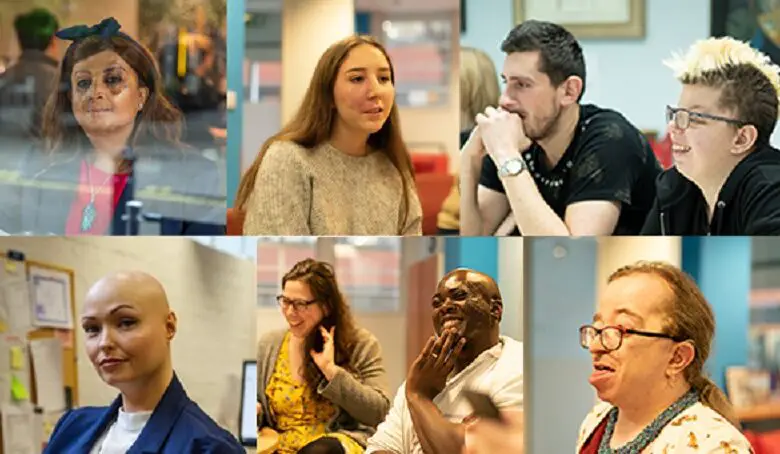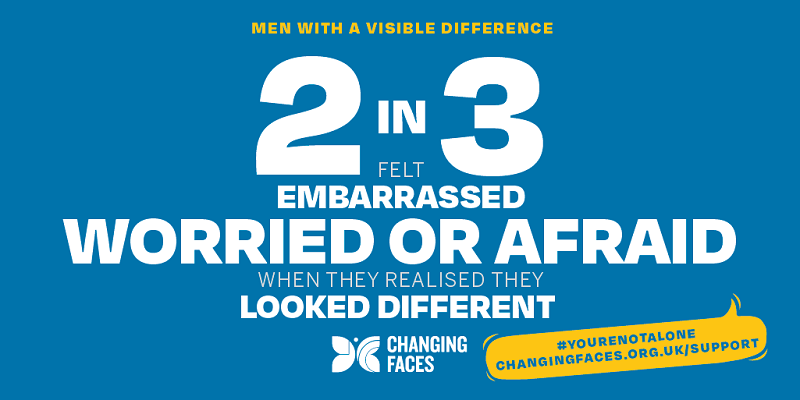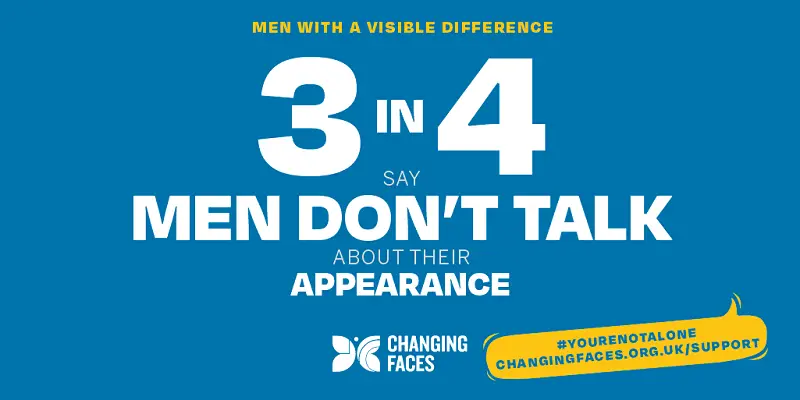
Two-thirds of men with a disfigurement feel embarrassed, worried or afraid
A survey of more than 1,000 men with a visible difference by charity Changing Faces reveals that 76% say they are under pressure to meet macho male stereotypes and 64% of those with a disfigurement feel embarrassed, worried or afraid because they look different.
 Nearly 1 in 5 people self-identify as having a visible difference, such as a mark, scar or condition, and at least 1.3 million children, young people and adults in the UK are estimated to have significant disfigurements. This figure includes 569,000 with facial disfigurements.
Nearly 1 in 5 people self-identify as having a visible difference, such as a mark, scar or condition, and at least 1.3 million children, young people and adults in the UK are estimated to have significant disfigurements. This figure includes 569,000 with facial disfigurements.
Changing Faces has been providing advice and support, challenging discrimination, and campaigning for a world for everyone who has a mark, scar or condition that makes them look different.
The survey of 1,022 men with a mark, scar or condition that makes them look different*, highlights how men with a visible difference are contending with a double challenge.
They have to handle the reactions of others, and live in a society where talking about appearance is still more acceptable for women than men.
The charity also discovered that:
- Nearly three-quarters of men (72%) say there should be more conversations among men with visible differences
- More than half of men (56%) with a visible difference realised they looked different when they were a teenager or younger. One in six realised this when they were bullied at school because of how they looked.
- A quarter (23%) of men with a visible difference feel self-conscious or embarrassed about showing parts of their body.
- Six in 10 men with a visible difference agree people react differently to a man with a visible difference than a woman.
- One in 10 men with a visible difference has trouble with relationships or their sex life (10%) or say their visible difference has meant they have struggled to find a partner (9%).
- Nearly half of men (46%) say they have modified their behaviour because of their visible difference.

Changing Faces campaigner, Rory McGuire says: “When you look different you have to be ready for daily stares and comments. That takes its toll, particularly if you don’t feel able to talk about how it makes you feel.
In my late teens, I eventually started to speak out. At first, I shared my experiences online. I had positive reactions from all over the world, and closer to home.
People realised the impact of appearance-related bullying and abuse. Things started to change for the better.
We need men, and women, to know that it’s okay to talk about your appearance, and how other people’s reactions can make you feel.”
Changing Faces ambassador, and actor, Adam Pearson says: “When I look back at the young man I was, to the person I have become, I am very proud of him. It’s not always easy looking different in a world that is so focused on perfection.
Growing up there were no positive role models of people with disfigurements in the media. So now I’m on a mission to be more visible.
I speak out and share my experiences because if it helps one more man, or woman, feel able to share how they’re feeling about their appearance, that’s a job well done.”

Changing Faces says currently only around two in 10 of the clients they support are men and have launched a campaign to encourage more men to come forward and access support services, such as free one-to-one counselling, peer group chat and an online self-help programme.
By Changing Faces
*The survey ran online between 23rd October and 11th November 2019.
More on Disability Horizons…